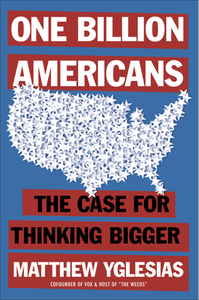You need to sign in or sign up before continuing.
Take a photo of a barcode or cover
pro-city! pro-density! pro-transit! pro-immigrant! pro-welfate state! pro-doing things!
if your main experience with matt yglesias is having his smarmiest tweets QT'd into your timeline and dunked on, consider re-evaluating your impressions of him. he might operate as That Guy From Your College Seminar in our national bird machine discourse, but the ideas here are good, well articulated, and something you could squint and imagine a broad, muscular, left coalition running on as a positive vision for the country.
if your main experience with matt yglesias is having his smarmiest tweets QT'd into your timeline and dunked on, consider re-evaluating your impressions of him. he might operate as That Guy From Your College Seminar in our national bird machine discourse, but the ideas here are good, well articulated, and something you could squint and imagine a broad, muscular, left coalition running on as a positive vision for the country.
Interesting: https://blogendorff.com/2021/02/18/book-review-one-billion-americans/
Do I agree with everything Yglesias says in this book? No. Do I even agree with half of it? I'm not sure. But I appreciate how he takes the readers beyond our normal bounds of what we think is true or important in the US. I like how he comes up with some very excellent solutions to some of our problems, although I doubt we have the will to institute most of them. I like how he takes some of our sacred cows, including some of mine, and pokes holes in them, but not in a condescending manner that will get people's defenses up, but more in a "have you ever thought about. . . " sort of way.
Having listened to Yglesias for a long time on The Weeds podcase, I was afraid that this book would be too dense and boring, but it is the opposite. It is written in a very simple and straightforward manner, and it is short. The average high school student could pick this up and understand most everything he is saying.
I also really, really like how the citations are at the bottom of the page, rather than at the back of the book. I know this is a bigger pain for the publisher and printer, but it is SO MUCH better than flipping back and forth, trying to figure out where the footnote is that the text is referring to, etc.
Yglesias still seems to believe in American exceptionalism, and some of his text about making sure the US remains the biggest power in the world rubbed me the wrong way. He also tends to talk about people with more skills as being more desirable in the country, even though prior to that he spends a lot of time talking about how allowing more people, even very poor people, will bring up the country.
I appreciated how he talked about how we need to discuss how increasing immigration, making more housing, increasing public transit, etc. will help the nation as a whole, rather than framing it as helping the immigrant, the homeless, the carless, etc. Because it will, and policy will get more traction by emphasizing the good to the country as a whole.
I wasn't sure I wanted to read the book when I heard him talk about it, but it was included in my Pantsuit Politics Book Club Subscription, and I am glad it was!
Having listened to Yglesias for a long time on The Weeds podcase, I was afraid that this book would be too dense and boring, but it is the opposite. It is written in a very simple and straightforward manner, and it is short. The average high school student could pick this up and understand most everything he is saying.
I also really, really like how the citations are at the bottom of the page, rather than at the back of the book. I know this is a bigger pain for the publisher and printer, but it is SO MUCH better than flipping back and forth, trying to figure out where the footnote is that the text is referring to, etc.
Yglesias still seems to believe in American exceptionalism, and some of his text about making sure the US remains the biggest power in the world rubbed me the wrong way. He also tends to talk about people with more skills as being more desirable in the country, even though prior to that he spends a lot of time talking about how allowing more people, even very poor people, will bring up the country.
I appreciated how he talked about how we need to discuss how increasing immigration, making more housing, increasing public transit, etc. will help the nation as a whole, rather than framing it as helping the immigrant, the homeless, the carless, etc. Because it will, and policy will get more traction by emphasizing the good to the country as a whole.
I wasn't sure I wanted to read the book when I heard him talk about it, but it was included in my Pantsuit Politics Book Club Subscription, and I am glad it was!
Like an extended Weeds episode, informative deep dive on a unique idea. Quick read and easy to follow. Really wish I knew about Maximum Canada first though.
hopeful
informative
medium-paced
informative
inspiring
fast-paced
informative
medium-paced
Overall, a very well-argued book. Most progressives will furrow their brows over the hawkish tone towards China that the book starts off with, but this isn't a book about global competition; it's a book about improving Americans' quality of life. Everything that the book argues for can and is argued for without the prior justification of spurring population growth.
What I appreciate the most is an argument for immigration that breaks out of the Democratic-leaning immigration-neutral stance and the outright xenophobic Republican-leaning immigration-hostile stance into a full-throated endorsement of immigration and immigrants of every capacity. The book makes the argument very convincingly that all of it benefits the country and that it isn't even a question. It's also the only moral path forward.
Yglesias is a will continue to be a liberal, and a lot of the comorbidities of that way of thinking follow into the book. There are parts where he outrightly rejects the view of politics as power and embraces what he confesses is a technocratic view of the situation, which is he even recognizes as going out of fashion.
If he was more concerned with politics as power, he would be better situated to actually talk about all the forces in our society holding back every one of his proposals, but that conversation is never had and rarely mentioned, even in passing. This is a critical flaw of his book in terms of its capacity to be used as a roadmap for enacting legislation: it doesn't tell us who our enemies are.
Furthermore, I would be interested in other feminists' perspectives on--not so much his proposals--but the risks of marketing his proposals under the banner of increasing our population, although it is something he attempts to address.
The only thing else is that an approach fixated on a single metric, as Yglesias promotes, runs the risk of slamming into Goodhart's Law: "When a measure becomes a target, it ceases to be a good measure," which is another reason why, for the purposes of my thinking, the book serves mainly as a reminder that generous social policies are by and large correlated with higher population growth, and that's far from a bad thing.
What I appreciate the most is an argument for immigration that breaks out of the Democratic-leaning immigration-neutral stance and the outright xenophobic Republican-leaning immigration-hostile stance into a full-throated endorsement of immigration and immigrants of every capacity. The book makes the argument very convincingly that all of it benefits the country and that it isn't even a question. It's also the only moral path forward.
Yglesias is a will continue to be a liberal, and a lot of the comorbidities of that way of thinking follow into the book. There are parts where he outrightly rejects the view of politics as power and embraces what he confesses is a technocratic view of the situation, which is he even recognizes as going out of fashion.
If he was more concerned with politics as power, he would be better situated to actually talk about all the forces in our society holding back every one of his proposals, but that conversation is never had and rarely mentioned, even in passing. This is a critical flaw of his book in terms of its capacity to be used as a roadmap for enacting legislation: it doesn't tell us who our enemies are.
Furthermore, I would be interested in other feminists' perspectives on--not so much his proposals--but the risks of marketing his proposals under the banner of increasing our population, although it is something he attempts to address.
The only thing else is that an approach fixated on a single metric, as Yglesias promotes, runs the risk of slamming into Goodhart's Law: "When a measure becomes a target, it ceases to be a good measure," which is another reason why, for the purposes of my thinking, the book serves mainly as a reminder that generous social policies are by and large correlated with higher population growth, and that's far from a bad thing.
hopeful
informative
fast-paced
As a long time ‘Weeds’ listener I wasn’t surprised that Yglesias would pick a provocative title to serve as a basis for a discussion of immigration on steroids and a host of tangential policy ideas related to population increase. In effect, throwing out left field policy hot takes is his bread and butter every week. However, I was a little disappointed that the book was a bit thin both in depth and quite frankly in quality at times – I suppose the bar was set a bit too high (and it’s only about the length of six Weeds episodes). Needless to say, the main topic is theoretical at best as neither of the major parties would take up such an idea, although perhaps the idea and other policy proposals will seed idea generation at think tanks which wouldn’t be a bad thing. But in spite of setting the bar too high this was still a very engaging read.
Discusses an interesting idea. But ultimately I would say the USA government needs to enact pretty much all of the legislation mentioned in the book to better support the current population before we start thinking about tripling said population.



